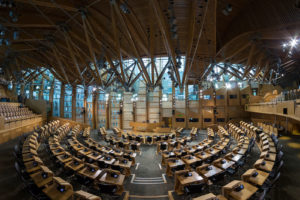
On 4 January First Minister of Scotland (“FMS”) announced additional restrictions for mainland Scotland, which had been on level 4 restrictions. The FMS pointed out that these new restrictions imposed a “temporary lockdown”, with “a legal requirement to stay at home except for essential purposes”. The new regulations were made on 4 January under the affirmative procedure, laid before the Scottish Parliament on 5 January, and came into force on 5 January. The government’s official guidance was updated on 4 January. The Regulations enacting these measures into law are The Health Protection (Coronavirus) (Restrictions and Requirements) (Local Levels) (Scotland) Amendment (No. 10) Regulations 2021, which amended The Health Protection (Coronavirus) (Restrictions and Requirements) (Local Levels) (Scotland) Regulations 2020.
Rather than making a televised announcement, the FMS recalled the Scottish Parliament and announced the new measures there. The legislature was in recess between the 24 of December 2020 and the 8 of January 2021 (inclusive). By announcing these restrictive measures before Scottish Parliament, rather than on the media, the significance of the representative assembly as the place where significant policy announcements shall take place in a parliamentary democracy was underlined. The debate that followed underscored the importance of rights-related parliamentary review, as shown below.
The FMS had to provide a rational justification for the adoption of measures significantly encroaching on the rights to freedom of movement and assembly, among many others. She went on to say that the overall objective of these measures was “to save lives and to protect the NHS”. The FMS argued that the new strand of the coronavirus had caused a significant rise in COVID cases, risking overwhelming the NHS. In her statement, the FMS recognised the adverse impact of these measures on the freedom of religion and on economic freedoms. She also expressed concern about the rights of workers who must stay at home and who have child caring responsibilities. The FMS expanded on the vaccination plans (associated with the right to health), as well as on mitigating plans to protect the right to education of children and young people, mainly by considering and supporting online learning.
By allowing time for questions, MSPs had a chance to hold the government to account for the decision on the temporary lockdown, to question the quality of the policies and support packages to mitigate the adverse effects of the temporary lockdown, and to raise relevant issues regarding these matters. Most of MSPs’ questions raised concerns regarding the rights to education and health. In relation with the right to education, the leaders of the four main opposition parties, namely Davidson (Con), Leonard (Lab), Harvie (Green) and Rennie (LD), raised concerns about children and young people’s wellbeing and equality of access to high-quality education, and identified several challenges regarding home schooling education, stressing the need for support to parents and schools. Secondly, regarding the right to health, there were various interventions by MSPs, mainly directed at requiring information about testing capacity, vaccination figures, timescales, priorities lists and plans, while other interventions noted the lack of consistency and clarity about information provided officers on vaccine effectiveness and transmissibility between young people.[1] Other MSPs raised concerns about the implications of the “stay at home” rule for the right to work. Davidson (Con) urged for clarity over what constitutes essential labour and a key worker, Rennie (LD) on advice, support and childcare for parents who are not key workers, and Findlay (Lab) asked for a helpline providing free and impartial advice on workers’ rights and their health and safety at work. Other social rights featured in MSPs’ questions, including calls to protect low-income workers suffering from financial hardship, to deliver free food and items to those shielding during lockdown, to address the situation of home care workers, and to protect the right to housing by extending the current ban on evictions.
While detailed scrutiny of government policies, including coronavirus-related ones, takes place mainly at select committees, andScottish Delegated Powers and Law Reform Committee will subject the 2021 Regulations to scrutiny in due course, this brief piece shows the value of announcing government policies through Parliament. The fact that the announcement took place through a FMS’s statement before the Scottish Parliament rather than a televised address engaged both government and parliament in an exercise on justification and assessment. The FMS provided justification, and MSPs had an opportunity to hold the government to account for its Covid-related policies and to raise relevant issues related to human rights and the rule of law, illustrating fidelity to a culture of political justification for restrictive measures having a negative impact on human rights.
[1] Davidson (Con), Leonard (Lab), Harvie (Green), Cameron (Con), Baillie (Lab), Crawford (SNP), Smith (Con) and Grant (Lab). Note also a relevant question by Mason (SNP), raising concerns about the mental health of single people during lockdown.
